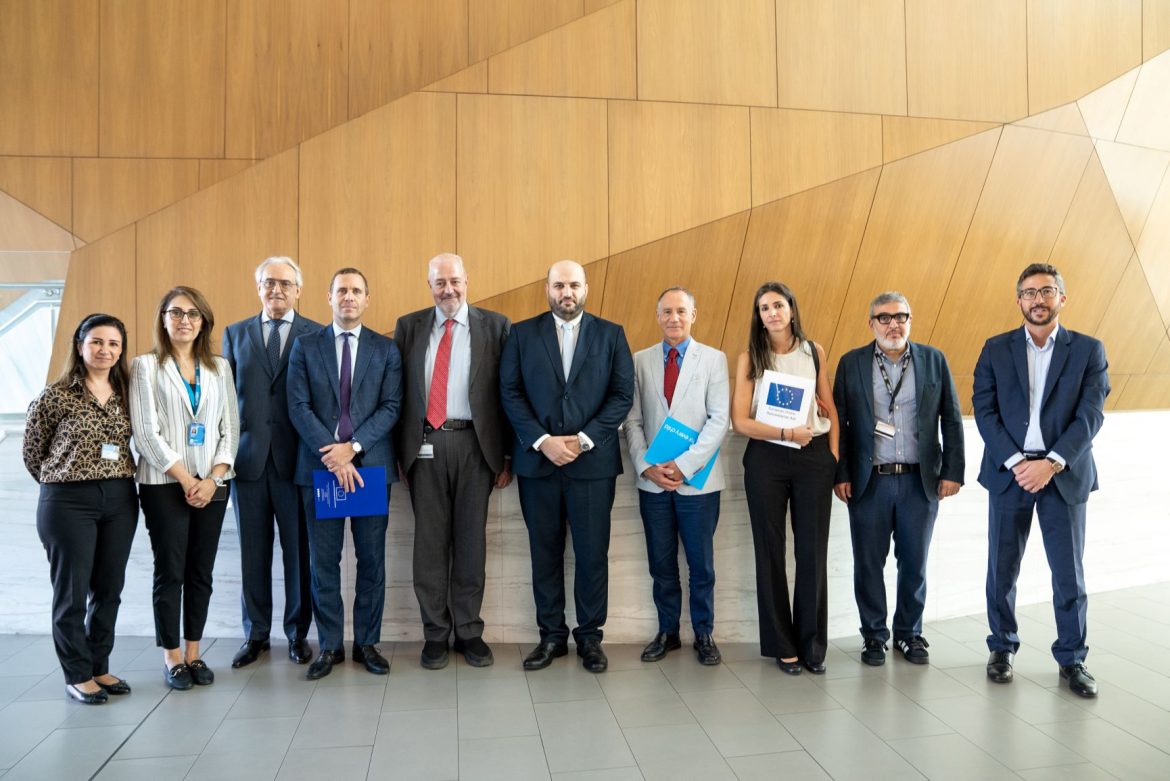Beirut, 24 September 2025 –Ministry of Public Health (MOPH), Dr. Rakan Nassereddine, in partnership with UNICEF and the European Union and in collaboration with the Ghassan Abu Sittah Children’s Fund (GASCF) visited children receiving specialized care under the Assistance and Care for War-Wounded and Affected Children (ACWA) programme. This visit underscored both the life-changing impact of ACWA and the urgent needs of injured children and their families.
Launched in March 2025, the ACWA programme is a multi-sectoral intervention led by the MoPH and UNICEF in partnership with INARA and GASCF. To date, ACWA has provided 426 children with critical medical treatment, surgeries, prosthetics, rehabilitation, and mental health and psychosocial support services, out of 1,400 identified children eligible for assistance.
Minister of Public Health, Dr. Rakan Nassereddine said: “I would like to commend the importance the ‘ACWA’ programme during an extremely difficult period for Lebanon. I extend my thanks to the European Union and UNICEF, who continue their support not only through the ‘ACWA’ programme but also through many initiatives and programmes that strengthen children’s well-being and support public hospitals. I will be working tirelessly to ensure the sustainability of this programme at the national level, so that its impact endures well beyond the current emergency.”
The “ACWA” programme also ensures children receive sustained comprehensive support including case management, education referrals, integration services and help for families to access the National Disability Allowance (NDA). It also supports strong accountability, upholding child rights policies and coordination with national systems.
Samy Saadi, Deputy Head of the EU Delegation said: “The European Union through its humanitarian funding is supporting a vital holistic programme in Lebanon that delivers urgent medical treatment, reconstructive surgeries, trauma care, and psychosocial support for children wounded and their families affected by the conflict. Since the onset of the crisis, we have worked closely with the Ministry of Public Health and partners to provide trauma surgical kits, emergency medical services, and specialized care, among other services. During today’s visit, we heard the stories of children and families whose lives have been shattered by violence. These testimonies are a stark reminder of the devastating consequences of war on civilians, and of the unacceptable toll borne most heavily by children.”
One year since the escalation of conflict in Lebanon, and almost 10 months since a ceasefire came into effect, children continue to bear the brunt of violence. Since the start of the conflict in September 2024, over 300 children have been killed and roughly 1,500 injured. Even after the ceasefire, children’s lives continue to be threatened, with at least 13 more children killed and dozens more injured in ongoing incidents, including three children killed this past weekend.
Children have been severely harmed, some with catastrophic physical injuries such as brain trauma, burns, or the loss of limbs; many more have endured psychosocial distress with effects that can last a lifetime.
“The war in Lebanon has stolen childhoods, futures, and lives. No child should ever pay the price of violence,” said Marcoluigi Corsi, UNICEF Representative in Lebanon. “Every child killed or injured is not just a tragedy for their family, but a loss for Lebanon’s future. Through ACWA, we are standing with children and families, making sure they receive not only urgent medical care but also long-term rehabilitation and psychosocial support to heal visible and invisible wounds. Hostilities must cease immediately to ensure the protection of every child”.
“Lebanese children cannot afford to wait,” said Corsi. “With the ceasefire broken repeatedly, dangers remain ever-present. UNICEF calls for an immediate cessation of all hostilities, full respect for the ceasefire of November 2024, and for the international community to stand by Lebanon’s children, ensuring no child is left behind.”
Dr. Ghassan Abu Sittah said: “We see not just a child, but their families. We are able to intervene and tailor the treatment pathway for each child beyond the surgical intervention. And we hope that as we progress, we are able to follow these children till they are 18. A child that is injured at war, according to the medical literature, will need between 8 and 12 surgeries, because their bodies want to grow, and the injured part of their body is unable to keep up with them”. “There’s no lonelier place in this universe than around the bed of a wounded child who has no more family to look after them.” He added.
Parents and caregivers of children injured in the conflict, can access support via the following hotline numbers +961 76 325 928, +961 76 835 307

